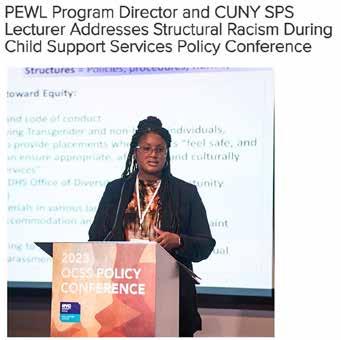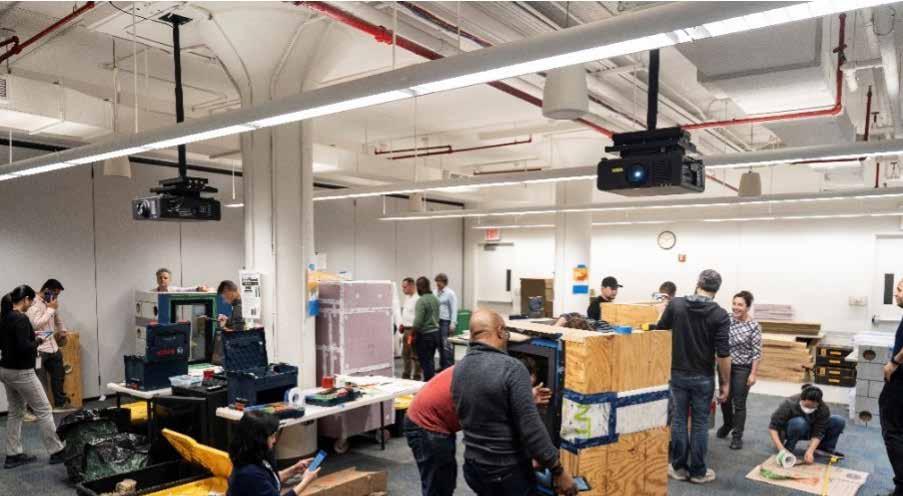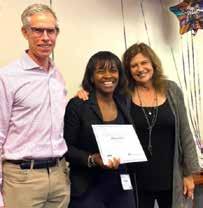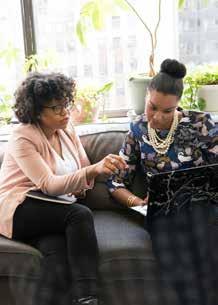
FY24 YEAR IN REVIEW


FY24 YEAR IN REVIEW
Office of Innovative Learning Solutions
Amy Perez
Executive Director, , Office of Innovative Learning Solutions
Jennifer Chand
Editor/Writer
Rebecca Brown Cesarani, Tanja Carter-Searls, Dawn Picken
Senior Program Directors
Alan Rubenstein
Copy Editor
Dorothy Robinson
Graphic Designer
Kelly Cunningham
Senior Graphic Designer
Marisa Osorio
Content Contributor



Photo credit: Chuck DeLaney
Welcome to the world of Innovative Learning Solutions (ILS) at CUNY SPS! I am delighted to showcase the FY24 Year in Review, which highlights the learning and development work of this extraordinary office.
In June 2024, our office rebranded from PEWL (Office of Professional Education and Workplace Learning) to ILS to better reflect our work and our mission: In practice, our unit of 220+ Learning and Development (L&D) professionals partner with our stakeholders to assess organizational needs; design, implement, and facilitate learning programs; build and maintain learning management systems and other learning technologies; evaluate impact and learning gains; and much, much more – as described in the following pages.
I hope this report demonstrates our added value to organizations and is a springboard for brainstorming your own organizational goals, gaps, and priorities. Have any questions? Want to share your feedback on the report itself? I welcome you to reach out – and look forward to speaking with you.
Amy Perez Executive Director amy.perez@cuny.edu
646-664-8646
Our mission is to enhance organizational effectiveness and elevate individual careers through the design and implementation of transformative learning programs.
• PROJECT MANAGEMENT • NEEDS ASSESSMENT • INSTRUCTIONAL DESIGN
• TRAINING OPERATIONS
• LEARNING AND DEVELOPMENT TECHNOLOGY
• COURSE DELIVERY
• EVALUATION AND REPORTING
• PROCESS RE-ENGINEERING AND POLICY DOCUMENTATION


Individual Learners Served: ~39,000 Total Budget: $48M
Number of ILS Programs: 14 Course Enrollments: ~99,000

Revenue, past four years:
Affirming Fatherhood Conference, NYC Department of Youth & Community Development
Presentation: Equity for Dads - Systemic Barriers to Fatherhood: Examining the Impact of Bias on Father Involvement
Presented by: Dorothea Nixon-Porter, Program Director, Anti-Bias Trauma-Informed Training
Presentation: How Do I?... Information on Managing a Child Support Case
Presented by:
Chuck DeLaney, Program Manager, OCSS/ CUNY Training Program
Ismael “Izzy” Laureano, ILS Trainer, OCSS/ CUNY Training Program
Eileen Culhane, ILS Curriculum Developer/ Trainer, OCSS/CUNY Training Program

Black Farmers and Urban Gardeners Conference
Presentation: NYC Land-Based Healing: Centering Black Youth & Youth of Color
Presented by:
Vanessa Nisperos, Associate Director, The Academy for Community Behavioral Health
Dr. Anna Ortega-Williams, BSW Director, Associate Professor at Silberman School of Social Work at Hunter College and Academy Innovation
Resident

Mind and Life Summer Research Institute: Awakening Compassion in Times of Division
Presentation: No Longer Alone — Nalanda Institute’s Compassion-Based Resilience Training (CBRT) as a Way to Protect and Nurture NYC Social Care Providers
Presented by:
Elise Tosatti, Program Director, The Academy for Community Behavioral Health
Developed by: Elise Tosatti and Lana Khamash, Research & Design Associate, The Academy for Community Behavioral Health
NYC Training Council Spring Showcase
Organized and hosted by ILS staff at CUNY SPS campus
NYC Office of Child Support Services Policy Conference: Confronting Structural Racism in the Child Support Program: Listening, Understanding, and Taking Action
Presentation: Understanding Structural Racism: Creating Change Through Awareness
Presented by: Dorothea NixonPorter, Program Director, Anti-Bias Trauma-Informed Training






Recognizing that our partners address diverse aspects of trauma through their unique missions and initiatives, ILS is committed to bringing critical awareness to trauma’s impacts and pathways to healing within social services.
Through rigorous research, co-design processes, and working closely with subject matter experts, ILS offers targeted coursework to equip care providers with trauma-informed practices that address a range of needs, for both the people they serve and themselves.

As a child welfare worker, understanding trauma and how it affects the [individual] is paramount to create a trusting relationship that allows them to retain services provided, and a chance at healing.”
– Overview of Trauma course participant
The Overview of Trauma course was created to help staff at the NYS Office of Children and Family Services (OCFS) recognize how trauma affects both children and adults. It is deemed essential for those working in the child welfare system and highlights various types of trauma, the symptoms of traumatic stress, the impact on long-term health, and the signs of secondary traumatic stress. The Adverse Childhood Experiences and Trauma Informed Practice course, also for OCFS staff, focuses more specifically on how to identify and understand the prevalence of childhood trauma.
Both courses offer practical tools that staff can utilize immediately in their daily work. Said one participant, “I can now help individuals by identifying the different body language and behaviors that may have resulted from a traumatic experience. This will help me to understand how to apply communication effectively or point someone to correct resources with the attitude of this is a safe space and I am here to help, because I truly care.”
The Tending the Roots: Recognizing Trauma and Cultivating Wellness course was created for staff at the NYC Administration for Children’s Services (ACS) and takes a closer look at the physical impacts of trauma.
“The body does not forget trauma even when we try to push it under the rug. We really define what wellness, resilience, and healing means and give [participants] a deeper understanding,” said Senior Facilitator Burnet Sylvester.
The Trauma: How It Impacts the Brain, Development and Behavior course for ACS further equips staff with a basic understanding of brain functioning and how trauma can impact a child’s brain development. Through thoughtful reflection time, group discussions, and practice opportunities, staff identify ways to use trauma-responsive language to effectively communicate and model collaboration with families.

One
of the most important things I learned in this course is that we all have some sort of trauma. However, I need to ensure I take care of myself first in order to be the best I can be for myself, and my staff.”
– Trauma Informed Organizational Practice course participant
In the full-day, in-person Anti-Bias Trauma-Informed (ABTI) training, discussions around unconscious bias and trauma can feel deeply personal and even fraught at times. Facilitating these conversations requires sensitivity and expertise to create a safe and inclusive space where everyone feels heard, and also empowered to apply what they learn back in the workplace.
Recognizing this, ABTI facilitators take great care in fostering a sense of community and openness in the classroom. They provide fidget toys to help expend nervous energy and add a bit of play. They introduce non-confrontational language and gestures that participants can use to
express support or disagreement. And perhaps most importantly, facilitators openly share their own stories, creating an atmosphere where learners feel encouraged to do so as well.
“This work is imperative because it’s something we can all do – create a space where people feel physically safe and where someone feels comfortable sharing their story,” Dorothea NixonPorter, ABTI Program Director, said. “We help people learn how to better understand and communicate with one another.”
The Anti-Bias Trauma-Informed training program has been nationally recognized by the American Public Human Services Association for its
“Everything I’ve learned today has been and will be utilized in my career because change starts with us.”
– Anti-Bias TraumaInformed course participant
exceptional leadership and educational contributions to the field of health and human services.

PARTNER: NYC Department of Citywide Administrative Services
PROGRAM: Energy Management Institute
Since its inception, the Department of Citywide Administrative Services Energy Management Institute (DCAS EMI) has trained over 6,500 learners to make energy-smart decisions, implement operational improvements, and advocate for clean energy projects across New York City. EMI currently offers more than 40 learning events in three delivery options: instructor-led, hybrid, and self-paced. With the introduction of new laws and changing trends in energy use management, EMI needed an enhanced data-backed tool to assess training needs and ensure that the program portfolio aligned with local laws, identified topical and/ or competency gaps, and confirmed the suitability of learning modalities and the relevance of other course components (e.g., certifications, accreditations, etc.).
ILS partnered with DCAS EMI leadership to conduct the following:
• A review of the City of New York’s Local Law 97 Implementation Action Plan (LL 97 IAP) Report
• A review of DCAS Energy Management’s key performance indicators
• An analysis of five key areas of the training environment — learning outcomes, high impact learning practices, course modalities, facilitation (in-house vs. vendordelivered), and audience category Based on the results of this analysis, ILS developed a comprehensive curriculum map that highlighted how each course in the program portfolio aligned with LL 97 IAP’s recommended emission reduction opportunities (EROs), EMI’s performance indicators, and the five key areas.
The curriculum map was an integral decision-making tool in identifying opportunities to:
• Maximize the City’s investment in the EMI program, for example, by reducing the cost per student hour
• Reach a broader audience of City staff with differing skill levels and who hold a variety of jobs in the energy field
• Update training topics and materials to ensure alignment with procedural, policy, and technical changes that support the City’s goals
• Partner with new vendors who specialize in energy training and offer highly-valued certifications to help City staff build skills to implement emerging technology


PARTNER: NYC Human Resources Administration Office of Child Support Services (OCSS)
PROGRAM: OCSS Training Institute
The NYC Human Resources Administration Office of Child Support Services (OCSS) was searching for new avenues to effectively reach its clients with timely information about its products and services. It was especially essential that information about debt-reduction and other innovative programs for helping non-custodial parents reach its target audience. A new way to broadcast information could complement existing mediums – including the OCSS website and the OCSS Customer Service Center – in delivering the message to a broad base of the community.

ILS partnered with OCSS leadership to develop the OCSS Training Institute (TI), comprised of a team of ILS Learning and Development (L&D) staff dedicated to the following:
• Developing and delivering presentations on relevant childsupport topics to NYC agencies, community-based organizations, and other credible messengers in the community
• Offering a variety of modalities to meet audience needs, including in-person classes, virtual webinars, and “how to” videos on specific child support topics
• Creating and implementing outreach strategies to increase participation, including the use of text messaging to potential attendees
The Training Institute is now in its 10th year and is an integral partner to OCSS.
More than 2,900 agency staff, community-based workers, and parents have attended courses since inception.
Attendance increased five-fold in the past four years, from 175 individuals in 2020 to more than 1,000 in 2024.
In FY24, 19 different child supportrelated topics were offered, as well as translation services during sessions. 94% of attendees agreed that the TI offerings increased their understanding of both the child support process and where to find child support information.
“The presenters were excellent. They went above and beyond to make sure to address everyone’s questions. Really amazing, compassionate, and sympathetic team.”
—Training Institute attendee

PARTNER: NYC Opportunity
PROGRAM: The Academy for Community Behavioral Health
Since launching in FY21, the Academy for Community Behavioral Health (the Academy) has designed custom courses that prioritize experiential learning and equip NYC social service providers with relevant, behavioral health skills and tools to manage the emotional demands of their work.
The Academy’s outreach to NYC non-profit community organizations and City agencies revealed that care providers seek meaningful learning programs — beyond initial training — that support deeper skill development, real-world skill applications, and workforce resilience.

In FY24, the Academy added advanced courses that build on the experiential learning already taking place in foundational multi-session courses. Together, these foundational and advanced cohort-based courses offer learners a structured path to develop and apply progressively more advanced skills. For example, the Academy’s Grief and Loss curriculum offers a learning path that includes the following:
• A six-session introductory course, Understanding Grief and Loss, that introduces current research about grief, loss, and resilience, along with helpful strategies for supporting bereaved individuals
• An advanced seven-week course, Principles of Grief Support, to strengthen skills for leading bereavement support groups and providing 1:1 bereavement care
• Brief courses on special topics requested by learners, such as Sudden and Traumatic Losses and Organizational Responses to Loss
Since inception, 142 learners have completed the foundational Understanding Grief and Loss course. Of these, 27 advanced to complete Principles of Grief Support, which they described as positively impacting their personal and professional lives.
One participant had this to say, “Grief is all around us and I am honored to be someone who speaks about it and makes space for it. Now I have concrete tools (language, graphics, videos, information, and research articles) for those who struggle with the conversation. I can see myself using all of the tools with clients, staff, and colleagues. On a personal level, completing this had a profound effect on me: it gave me perspective on some of the darkest times in my life and it made me see some of my losses in ways that I had never considered before.”
Anaica Allen, a 2024 graduate of ILS’s Managing for Innovation (MFI) leadership program and Program Director of Atlas Functional Family Therapy, recently forged a partnership between her organization’s youth mental health services and the Staten Island Courthouse. By embedding an Atlas therapist in the courtroom, 11to 22-year-olds involved in the Staten Island criminal legal system now have access to much-needed therapy resources.

Anaica credits her success to a very simple tool – the elevator pitch she learned about in the MFI program.
“I had scheduled a meeting with two judges at the Staten Island Family Court after numerous efforts to lock in a date. To prepare for the meeting [we created] a PowerPoint presentation. Being part of MFI and learning
about the elevator pitch, it actually lit up something in my head and I thought the pitch could be better. If we talk for more than a minute, we may lose their attention. I knew I needed to revamp it.”
Anaica reached out to Clarke Griffith, ILS Program Director and MFI program lead, who worked with her to write an abbreviated pitch, leading to a very meaningful and productive conversation with the justices — a conversation that sparked several partnerships within the Staten Island criminal legal system.
“That [elevator] pitch opened the door for us to have another pitch with Staten Island Criminal Court.
So now we have a partnership with them, too, and we are also working to form a partnership with the Staten Island Supreme Court,” Allen said.
https://www.academy4cbh.org/
https://cuny.swoogo.com/unlocking-employment

“Our partnership with ILS allows us to benefit from experts and consultants who help us develop interactive learning programs to advance the work of the child welfare and juvenile justice workforce and to better serve the City’s most vulnerable children and families. I love the diversity of the staff and their commitment to racial equity and social justice.”
— Cheryl L. Beamon, Associate Commissioner with the NYC Administration for Children’s Services Office of Training and Workforce Development, about the ACS Workforce Institute partnership


“ILS has been instrumental in advancing the work of the Mayor’s Office for Economic Opportunity. Through our yearslong partnership, ILS has consistently delivered as an instructional designer, project manager, and training administrator, helping to build organizational capacity across our office, City partners, and the human service provider workforce.”
— Carson C. Hicks, Executive Director, NYC Mayor’s Office for Economic Opportunity

“The relationship between the DSS Office of Training and Workforce Development and the CUNY SPS ILS team is a blueprint for successful strategic partnerships. Their collaborative approach is vital to ensuring that our agency meets its learning and development goals.”

— Terrance B. Stroud, Deputy Commissioner, Office of Training and Workforce Development, Office of Policy, Procedures and Training, NYC Department of Social Services

“OCSS has benefited greatly from the partnership we have had in place with CUNY over the past 17 years. Procedures and training are necessary to any large, complex organization. They help to ensure compliance with federal, state, and local laws and regulations, and allow an organization to give staff the tools they need to effectively carry out their responsibilities. I am proud to say that with this partnership OCSS has been able to put in place procedures throughout OCSS where none existed in most areas and conduct numerous trainings.”
— Frances Pardus-Abbadessa, Executive Deputy Commissioner, Office of Child Support Services, NYC Human Resources Administration

ILS’ Academy for Community Behavioral Health marked three years of offering its Motivational Interviewing (MI) certificate program, the only one of its kind in New York City. This free program combines training, coaching, and implementation support to help NYC non-profit care providers use MI effectively in real-world settings. Between FY22 and FY24, 144 learners completed the six-week MI Foundations course and 61% demonstrated MI competence or higher at course end. Assessment results show that the course also helps learners avoid harmful, MI non-adherent behaviors such as confronting, dismissing, blaming, shaming, or diminishing someone’s autonomy. After demonstrating their own MI competence, a subset of learners went on to complete the Academy’s MI Supervisor course, and the Academy’s Train the Trainer workshop.
ILS utilized new technologies to optimize instructional design and learner experience. In the partnership with the NYS Office of Children and Family Services, designers are using AI software to convert eLearning script text into realistic sounding voice audio in both English and Spanish. ILS is also leveraging AI software to create microlearning that highlights critical components of newly updated and released procedures for its partnership with the NYC DSS DHS Staff Learning & Development Program. By adopting these emerging technologies, ILS provides faster development cycles, more consistent training products, and significant time- and cost-savings in addition to increased learner engagement.
ILS developed a proprietary system to maintain, expand, and support 100,000 square feet of classrooms, labs, and simulation rooms for its partners at the NYS Office of Children and Family Services. The
system, which was built in-house, allows users to make room reservations, view schedules, select seating and table configurations, and reserve technology resources. It also interfaces with the LMS and HR systems to generate comprehensive systematic reporting. This customized tool has been an incredible time-saving asset, connecting processes across multiple systems and giving staff more time to devote to training.
ILS became the sole virtual provider of the Family Development Credential (FDC) in New York City and is the only provider of the Empowerment Skills for Leaders program. The FDC curriculum is a 14-week interactive training for front-line workers and supervisors from public, private, and nonprofit health and human services systems, with an emphasis on empowerment and family support, to reorient the way services are delivered. The credential is issued by the University of Connecticut, and the program is currently offered at three CUNY campuses.
NYC Department of Correction (DOC) increased its funding for training programs and worked with ILS to expand leadership development and learning paths for midlevel managers. This includes certification in Outward Mindset and Outward Leadership, the Dale Carnegie certification program to boost presentation skills for DOC Leaders, and certification for DOC training staff to facilitate DiSC® (personality assessment tool) trainings internally. The expanded training programs are instrumental in supporting the agency in its mission to create a safe and supportive environment where staff can act with integrity and professionalism, while providing individuals in their care with a path to successful community reintegration.
The NYC Department of Homeless Services’ Financial Independence Now program enhanced its format and saw higher completion rates in FY24. Now in its seventh year, the program provides shelter staff with financial coaching strategies and tools to help their clients set and achieve financial goals. In the past, participants voiced a desire for more interactivity, and ILS responded. eLearning modules were updated to optimize both text and audio to meet different learning styles, as well as increase video content. The new format also includes an animated, learning platform navigation video, a virtual instructor-led review and implementation session, and an interactive review game.
The Coastal Storm Plan continues to prepare New Yorkers for future hurricanes. With super storms becoming more frequent, the need for New Yorkers to be prepared is more important than ever. The Coastal Storm Plan (CSP) program trains New York City agency staff for these weather emergencies and exemplifies how ILS works closely with the City to support its residents. The CSP program includes a variety of instructor-led online trainings, eLearning, and marketing videos, as well as field guides, pocket reference guides, just-intime training manuals, and other operational materials to be used in hurricane shelters and evacuation centers. Since its inception in 2005, tens of thousands of City employees have taken the training.

The DSS DHS Staff Learning & Development Program’s work helped DHS and HRA Housing Specialists gain valuable skills to efficiently help thousands of New Yorkers transition from the shelter system to stable housing, through targeted training. Over 1,400 staff from DHS provider agencies and HRA community-based organizations participated in training to learn how to complete and submit a City Fighting Homelessness and Eviction Prevention Supplement (CityFHEPS) housing packet, as part of the process that helps New Yorkers in need secure permanent housing.
The DSS Office of Training and Workforce Development (DSS OTWD)’s You-Centered Approach has been instrumental in increasing staff morale, engagement, and professional skills by focusing on three key dimensions: staff as individuals, staff as part of a team, and skill-building. Developed and facilitated by the DSS OTWD, in partnership with ILS, the NYS Office of Temporary and Disability Assistance, and SUNY Buffalo, the You-Centered Approach events provide staff with professional development opportunities in topics including self-care and stress management, communication skills and team building, selection of effective training modalities, experiential learning, and learning transfer.

NYC Department of Social Services Inception: 2019
This one-day, in-person training for DSS staff is focused on understanding automatic patterns of thinking, bias, and trauma, and their influence on behavior and decision-making in the workplace. It includes an eLearning component.
NYC Administration for Children’s Services
Inception: 2015
This comprehensive workforce development program provides ongoing, professional skills development for direct service staff and supervisors at ACS and its many partner agencies, including strengthsbased practices, coaching, safety and risk assessment, implicit bias, evidencebased modeling, and other specialized coursework.
NYC Department of Citywide Administrative Services and NYC Emergency Inception: 2010
This series of online courses is designed for City agency staff who are assigned a role in the Coastal Storm Plan evacuation and sheltering system and require training on procedures required for storm-related emergency operations. The program is also available to state, federal, NGO, and private partner organizations that provide support for these operations.
NYC Department of Social Services Inception: 2019
This comprehensive workforce development program focuses on operational processes and Citymandated topics for DSS’s Department of Homeless Services (DHS) and Human Resource Administration (HRA) and their provider staff.
NYC Department of Correction Inception: 2017
ILS coordinates leadership development, on-the job training, and other skill-building programs for uniform and non-uniform staff of the City’s correctional facilities, through relationships with a variety of learning and development vendors.
NYC Department of Citywide Administrative Services Energy Management Inception: 2009
EMI offers a broad range of trainings, certifications, and other technical support to City staff responsible for implementing energy-efficient measures that support the City’s major greenhouse gas emission reduction goals. This includes making energy-smart decisions, implementing operational improvements, and advocating for energy retrofits and clean energy projects across the City’s portfolio.
NYC Department of Homeless Services
Inception: 2018
This financial literacy learning and coaching program provides financial coaching strategies and tools to DHS agency and shelter-based staff to help shelter clients set and reach financial goals. The program also aims to increase client access to free financial counseling services at New York City Financial Empowerment Centers.
NYC Department of Youth and Community Development
Inception: 2011
This 14-week virtual training for front-line workers and supervisors from public, private, and nonprofit health and human services systems, emphasizes empowerment and family support to reorient the way services are delivered. The credential is issued by the Center for Culture, Health & Human Development at the University of Connecticut.
Con Edison and CUNY Building Performance Lab
Inception: 2018
This multi-course portfolio provides free gas safety training to residential building engineers, contractors, plumbers, superintendents, and property management firms of multifamily buildings throughout New York City.
NYC Human Resources
Administration Office of Child Support Services (OCSS)
Inception: 2008
This comprehensive workforce development program builds capacity among OCSS staff at all levels in operational processes and procedures to support the collection and distribution of child support payments, modification and enforcement of child support orders, and other key child support processes.
Mayor’s Office for Economic Opportunity
Inception: 2011
This in-person, leadership development program is designed for managers at New York City nonprofit organizations, City agencies, and Mayoral Offices who oversee City-funded human services programs and systems change initiatives. The curriculum focuses on key competencies needed for effective program management, such as strategic planning, performance monitoring, and contract management.



Mayor’s Office of Community Mental Health and Mayor’s Office for Economic Opportunity
Inception: 2021
The Academy provides a broad range of free courses to community-based organizations and other social service providers to address behavioral health. The program also pilots new community-centered care approaches, and offers custom services for city and state agencies.
NYS Office of Children and Family Services
Inception: 2010
This comprehensive, workforce development program provides state, local district, and provider agency staff (including child welfare and adult protective caseworkers and supervisors, juvenile justice staff, and foster/adoptive parents) with mandated training on topics designed to promote health and safety among children and adults.




Mayor’s Office for Economic Opportunity
Inception: 2018
This 90-minute, free eLearning course provides frontline staff and program leadership at NYC workforce development programs and criminal justice students with best practices and resources for working with job seekers who have legal-system involvement.



